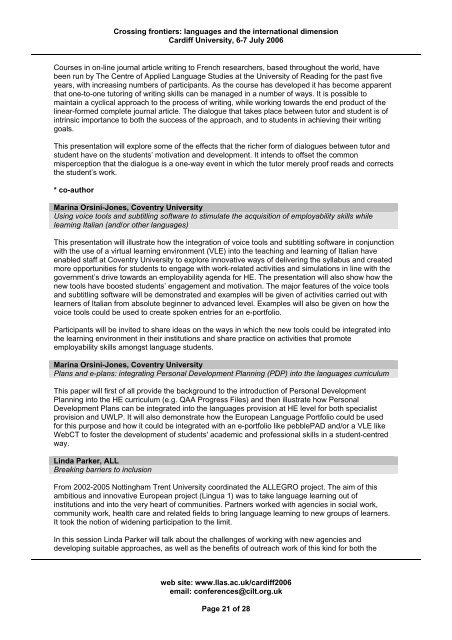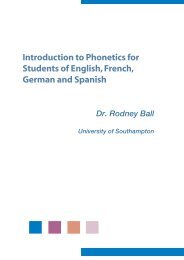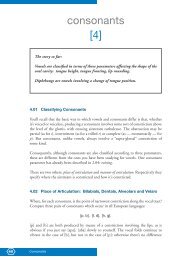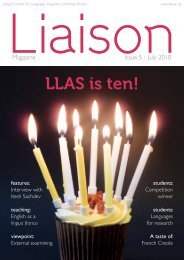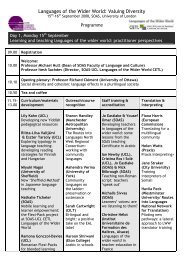Crossing frontiers: Languages and the international dimension
Crossing frontiers: Languages and the international dimension
Crossing frontiers: Languages and the international dimension
Create successful ePaper yourself
Turn your PDF publications into a flip-book with our unique Google optimized e-Paper software.
<strong>Crossing</strong> <strong>frontiers</strong>: languages <strong>and</strong> <strong>the</strong> <strong>international</strong> <strong>dimension</strong><br />
Cardiff University, 6-7 July 2006<br />
Courses in on-line journal article writing to French researchers, based throughout <strong>the</strong> world, have<br />
been run by The Centre of Applied Language Studies at <strong>the</strong> University of Reading for <strong>the</strong> past five<br />
years, with increasing numbers of participants. As <strong>the</strong> course has developed it has become apparent<br />
that one-to-one tutoring of writing skills can be managed in a number of ways. It is possible to<br />
maintain a cyclical approach to <strong>the</strong> process of writing, while working towards <strong>the</strong> end product of <strong>the</strong><br />
linear-formed complete journal article. The dialogue that takes place between tutor <strong>and</strong> student is of<br />
intrinsic importance to both <strong>the</strong> success of <strong>the</strong> approach, <strong>and</strong> to students in achieving <strong>the</strong>ir writing<br />
goals.<br />
This presentation will explore some of <strong>the</strong> effects that <strong>the</strong> richer form of dialogues between tutor <strong>and</strong><br />
student have on <strong>the</strong> students’ motivation <strong>and</strong> development. It intends to offset <strong>the</strong> common<br />
misperception that <strong>the</strong> dialogue is a one-way event in which <strong>the</strong> tutor merely proof reads <strong>and</strong> corrects<br />
<strong>the</strong> student’s work.<br />
* co-author<br />
Marina Orsini-Jones, Coventry University<br />
Using voice tools <strong>and</strong> subtitling software to stimulate <strong>the</strong> acquisition of employability skills while<br />
learning Italian (<strong>and</strong>/or o<strong>the</strong>r languages)<br />
This presentation will illustrate how <strong>the</strong> integration of voice tools <strong>and</strong> subtitling software in conjunction<br />
with <strong>the</strong> use of a virtual learning environment (VLE) into <strong>the</strong> teaching <strong>and</strong> learning of Italian have<br />
enabled staff at Coventry University to explore innovative ways of delivering <strong>the</strong> syllabus <strong>and</strong> created<br />
more opportunities for students to engage with work-related activities <strong>and</strong> simulations in line with <strong>the</strong><br />
government’s drive towards an employability agenda for HE. The presentation will also show how <strong>the</strong><br />
new tools have boosted students’ engagement <strong>and</strong> motivation. The major features of <strong>the</strong> voice tools<br />
<strong>and</strong> subtitling software will be demonstrated <strong>and</strong> examples will be given of activities carried out with<br />
learners of Italian from absolute beginner to advanced level. Examples will also be given on how <strong>the</strong><br />
voice tools could be used to create spoken entries for an e-portfolio.<br />
Participants will be invited to share ideas on <strong>the</strong> ways in which <strong>the</strong> new tools could be integrated into<br />
<strong>the</strong> learning environment in <strong>the</strong>ir institutions <strong>and</strong> share practice on activities that promote<br />
employability skills amongst language students.<br />
Marina Orsini-Jones, Coventry University<br />
Plans <strong>and</strong> e-plans: integrating Personal Development Planning (PDP) into <strong>the</strong> languages curriculum<br />
This paper will first of all provide <strong>the</strong> background to <strong>the</strong> introduction of Personal Development<br />
Planning into <strong>the</strong> HE curriculum (e.g. QAA Progress Files) <strong>and</strong> <strong>the</strong>n illustrate how Personal<br />
Development Plans can be integrated into <strong>the</strong> languages provision at HE level for both specialist<br />
provision <strong>and</strong> UWLP. It will also demonstrate how <strong>the</strong> European Language Portfolio could be used<br />
for this purpose <strong>and</strong> how it could be integrated with an e-portfolio like pebblePAD <strong>and</strong>/or a VLE like<br />
WebCT to foster <strong>the</strong> development of students' academic <strong>and</strong> professional skills in a student-centred<br />
way.<br />
Linda Parker, ALL<br />
Breaking barriers to inclusion<br />
From 2002-2005 Nottingham Trent University coordinated <strong>the</strong> ALLEGRO project. The aim of this<br />
ambitious <strong>and</strong> innovative European project (Lingua 1) was to take language learning out of<br />
institutions <strong>and</strong> into <strong>the</strong> very heart of communities. Partners worked with agencies in social work,<br />
community work, health care <strong>and</strong> related fields to bring language learning to new groups of learners.<br />
It took <strong>the</strong> notion of widening participation to <strong>the</strong> limit.<br />
In this session Linda Parker will talk about <strong>the</strong> challenges of working with new agencies <strong>and</strong><br />
developing suitable approaches, as well as <strong>the</strong> benefits of outreach work of this kind for both <strong>the</strong><br />
web site: www.llas.ac.uk/cardiff2006<br />
email: conferences@cilt.org.uk<br />
Page 21 of 28


